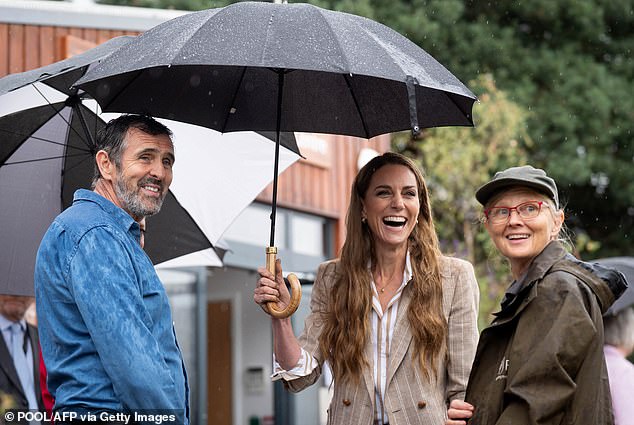It doesn’t matter how much money you have, how famous you are, how luxurious your life appears to be, being diagnosed with cancer is never easy.
It affects every aspect of your life, not just your health. Thankfully, more of us are surviving what was once a dire prognosis, however recovery time does take much longer than people anticipate. And it’s not always an easy ride.
Everyone recovering from cancer will have some setbacks now and again.
Nothing ever goes smoothly. Last week, in a touching chat with patients at a cancer wellbeing centre at Colchester Hospital, the Princess of Wales spoke about her own experience and the pressure of putting on a ‘brave face’ through treatment and recovery, where ‘everybody expects you to be better – but that’s not the case at all’.
In a moving admission, Kate said that the ‘very scary, very daunting experience’ did not end with the conclusion of treatment, with patients needing to take time to find their ‘new normal’.
Kate, 43, who is continuing a slow and measured return to public life while in remission from an undisclosed form of cancer, said there was an expectation that patients ‘crack on, get back to normal’.
It can be tempting for the person recovering from cancer to feel under pressure to conform to this, to get back to navigating work and family life and carrying on as though nothing happened.
There is an idealised survivor narrative – the story we like to hear about people who have survived cancer.
It has a nice, smooth plotline to it: the person is sick, then they undergo treatment, they recover and everything goes back to how it was.
Many of us don’t like the idea that maybe the cancer has changed them, or the recovery will take a long time, or there will be bumps in the road.

Catherine, Princess of Wales, laughs during a visit to the RHS Wellbeing Garden at Colchester Hospital in Essex on Wednesday July 2
Cancer sufferers feel under tremendous pressure to conform to this narrative.
When I was working in a specialist mental health service for people with cancer, we spent a lot of time preparing people for their ‘bumpy’ recovery journey.
Patients often dismissed the support, assuring me they’d been given the all-clear, the treatment was a success, and they just wanted to get back to their old life.
A fair number would cancel follow-up appointments, explaining that they didn’t want reminders of what they’d been through.
There was also clearly an implicit pressure from those around them – often unintentionally – for them to show everyone how well they were doing.
Yet inevitably they would hit a snag. Realising it wasn’t all quite the plain sailing they had expected, they’d call and ask to be seen.
What was interesting is that they would often feel a failure for having difficulties and now needing help or even further treatment. They felt they had let everyone down.
What’s more, these patients often revealed how they felt their friends and family were no longer able to support them – a type of compassion fatigue had set in. At least this is what they feared, and they felt unable to lean on their loved ones in the way they had before.
They want reassurance that this awful episode is long forgotten, but the reality is that it often isn’t.
This puts a tremendous pressure on cancer survivors to present as though everything is fine; it doesn’t allow them any wobbles. It takes time to recover and get back to normal, and the stark truth is that things never might go back to quite what they were before.
It’s vital that anyone supporting someone with cancer understands that it won’t be a smooth ride. Months or even years later, they will still need support. It’s not a failure on their part if things don’t go to plan.
So, what can you do to help those recovering from cancer? How can you make sure you’re one of the people they feel they can turn to if things don’t go smoothly?
- Be present and listen: Sometimes just being there without offering solutions is the most comforting thing to do. Resist the temptation to try to solve things, instead just lend a friendly ear.
- Validate their feelings: Acknowledge their fears, frustrations, or sadness without judgment. Don’t forget that depression or anxiety may persist far beyond active treatment.
- Stay in touch regularly: Check in with simple texts, calls or visits to maintain connection.
- Celebrate milestones: Recognise ‘cancer-versaries’ or scan results with meaningful gestures such as a card or invite them out for a drink.
- Offer encouragement: Remind them of how far they’ve come, especially on hard days.
- Support rest and recovery: Encourage downtime and avoid overscheduling. Respect their boundaries and remember that healing looks different for everyone; avoid pressure to ‘get back to normal’.
- Accept lingering side effects: Fatigue, neuropathy (nerve pain), or brain fog can last long after treatment. This isn’t their fault and is all part of recovery.
- Reinforce their identity beyond cancer: Support all of their interests, passions and new goals.
- Include them in activities: Help them re-engage with social circles at their pace.
- Continue supporting long after the ‘end’ of treatment: Remember that recovery can take years and be invisible to others. Ask regularly how you can help and be aware that what they need may change over time.
Let’s end the stigma over crying
Rachel Reeves, pictured sobbing in the House of Commons last week, has caused a debate about whether or not it’s okay to cry at work.
It does seem strange that while it’s fine to show some emotions – such as anger, happiness, frustration – crying still has a stigma attached to it.
I tend not to show my emotions at work, but this took practice, especially as I have to see and hear some truly awful things.
When I started my medical career, I found it very hard to hide what I was feeling.
At the time I thought that it would have been unprofessional of me to show such emotion. But now, I wonder… sometimes tears send exactly the right message.

The moment a tear runs down Chancellor Rachel Reeves’ cheek on Wednesday July 2
There’s been a notable rise in older dads, according to the Office for National Statistics, with babies born to fathers over 60 up by 14.2 per cent in 2024 compared with the year before.
I admit to wrestling with the idea of men fathering children in their 60s, 70s or even 80s. Surely this is too old to keep up with the physical demands of parenthood. But then I thought more. I thought about the children I’ve seen who have been brought up by their grandparents – and it’s been the making of them.
There’s something about someone in a caring role who is that bit older, that bit wiser. The problem in society isn’t older fathers. It’s absent fathers.
DR MAX PRESCRIBES…
COLD BLANKET

If you’ve struggled with the heatwave, this might be a life-saver.
These ‘cold blankets’ draw heat away from the body, keeping you cool in bed. No more sticky nights.
There’s a lot out there but I’d recommend one that can be machine washed.












